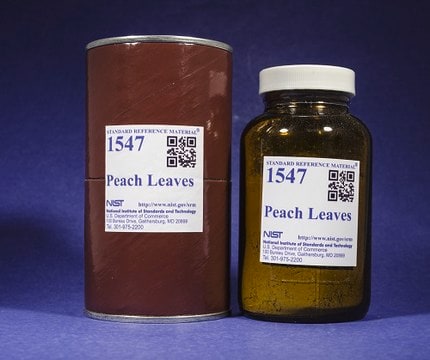NIST1515
Apple leaves
NIST® SRM® 1515
Synonym(s):
Apple Leaf Sample
Sign Into View Organizational & Contract Pricing
All Photos(1)
About This Item
UNSPSC Code:
41116107
NACRES:
NA.24
Recommended Products
grade
certified reference material
Quality Level
packaging
pkg of 50 g
manufacturer/tradename
NIST®
format
matrix material
General description
This Standard Reference Material (SRM) is intended primarily for use in validating analytical methods for the determination of major, minor, and trace elements in botanical materials, agricultural food products, and similar materials. This SRM can be used for quality assurance when assigning values to in-house control materials. For more information, please refer to the SDS and COA.
SRM 1515_cert
SRM 1515_SDS
SRM 1515_cert
SRM 1515_SDS
application
- Phytochemical analysis for postharvest disease control: A study explored the phytochemical characterization of forest leaves, including apple leaves, and their application in controlling apple postharvest diseases, highlighting the potential of apple leaf extract in plant-based disease management strategies (Hajji-Hedfi et al., 2024).
- Agrochemical interactions in apple cultivation: Research on the optimization of irrigation and fertilization strategies for apples in arid areas incorporated analysis of apple leaves to assess plant health and nutrient uptake, underscoring the role of natural plant extracts in sustainable agriculture (Duan et al., 2024).
- Screening for disease resistance in apple breeding: An efficient gene screening system from wild apple leaves in response to pathogenic fungi was developed, demonstrating the utility of apple leaf extracts in identifying and harnessing natural resistance traits in plant breeding (Wen et al., 2023).
Other Notes
Certified for the analytes listed below. See certificate for values and more details
Nitrogen (Total) (N), Phosphorus (P)
Trace Elements:: Aluminum (Al), Boron (B), Barium (Ba), Barium (Ba), Cadmium (Cd), Calcium (Ca), Chlorine, Copper (Cu), Iron (Fe), Lead (Pb), Magnesium (Mg), Manganese (Mn), Mercury (Hg), Molybdenum (Mo), Nickel (Ni), Potassium (K), Rubidium (Rb), Sodium (Na), Strontium (Sr), Vanadium (V), Zinc (Zn)
Matrix Group: Fruits and Vegetables
Nitrogen (Total) (N), Phosphorus (P)
Trace Elements:: Aluminum (Al), Boron (B), Barium (Ba), Barium (Ba), Cadmium (Cd), Calcium (Ca), Chlorine, Copper (Cu), Iron (Fe), Lead (Pb), Magnesium (Mg), Manganese (Mn), Mercury (Hg), Molybdenum (Mo), Nickel (Ni), Potassium (K), Rubidium (Rb), Sodium (Na), Strontium (Sr), Vanadium (V), Zinc (Zn)
Matrix Group: Fruits and Vegetables
Legal Information
NIST is a registered trademark of National Institute of Standards and Technology
SRM is a registered trademark of National Institute of Standards and Technology
Related product
Product No.
Description
Pricing
Storage Class
13 - Non Combustible Solids
wgk_germany
WGK 3
flash_point_f
Not applicable
flash_point_c
Not applicable
Choose from one of the most recent versions:
Certificates of Analysis (COA)
Lot/Batch Number
Sorry, we don't have COAs for this product available online at this time.
If you need assistance, please contact Customer Support.
Already Own This Product?
Find documentation for the products that you have recently purchased in the Document Library.
Customers Also Viewed
Multi-elemental speciation analysis of barley genotypes differing in tolerance to cadmium toxicity using SEC-ICP-MS and ESI-TOF-MS.
Persson P D, et al.
Journal of Analytical Atomic Spectrometry, 21(10), 996-1005 (2006)
Valfredo Azevedo Lemos et al.
Journal of hazardous materials, 159(2-3), 245-251 (2008-03-21)
A new, simple and versatile cloud-point extraction (CPE) methodology has been developed for the separation and preconcentration of copper and nickel. The metals in the initial aqueous solution were complexed with 2-(2'-benzothiazolylazo)-5-(N,N-diethyl)aminophenol (BDAP) and Triton X-114 was added as surfactant.
Our team of scientists has experience in all areas of research including Life Science, Material Science, Chemical Synthesis, Chromatography, Analytical and many others.
Contact Technical Service







